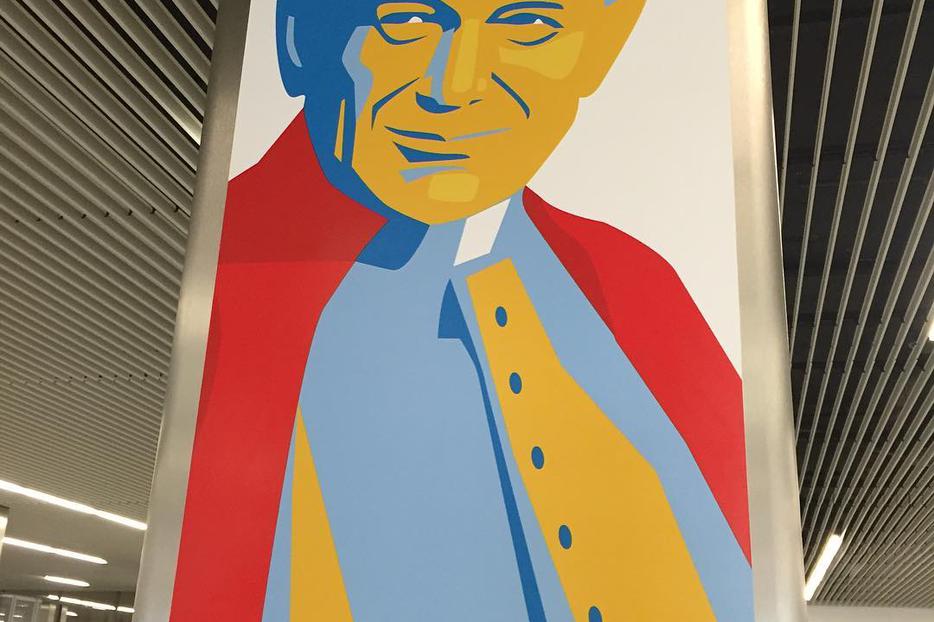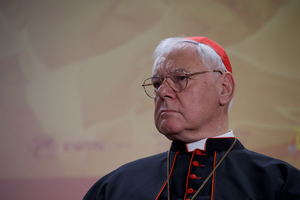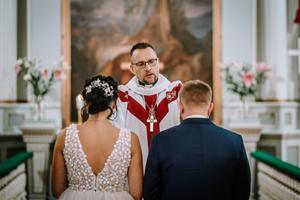World Youth Day in the ‘Capital of Mercy’
Pope Francis says his entire WYD visit to Poland ‘will be inspired by mercy during this Jubilee Year and by the grateful and blessed memory of St. John Paul II.’

KRAKOW, Poland — “Krakow is the capital of mercy,” said Cardinal Stanislaw Dziwisz. “From here, as Sister Faustina wrote, a spark will emerge, the spark of Divine Mercy, and this spark will contribute to the deepening of religious life in the world.”
The archbishop of Krakow was speaking to EWTN Germany July 21, ahead of World Youth Day, which runs July 26-31 in and around the Polish city. The archbishop said he hopes the young people who attend “will entrust themselves to the message of Divine Mercy and take that spark to all nations.”
Organizers for the event, which contains the theme “Blessed Are the Merciful, for They Shall Obtain Mercy,” said that, by July 22, 364,729 individual pilgrims from 187 countries had registered for the celebration. The largest number, with more than 172,000 registered pilgrims, are coming from Poland. There were even 22 pilgrims making the trip from war-torn Syria. Approximately 30,000 pilgrims have registered from the United States, more than to any World Youth Day in the past. In addition, according to the official Twitter account for World Youth Day in English, in attendance there will be 844 bishops and 47 cardinals from 107 countries.
“The event is aimed at encouraging pilgrims to rediscover their faith and then to share it with those coming to Poland,” said Dorota Abdelmoula, spokeswoman for WYD Krakow. “It’ll also be a time for them to discover their faith and roots, also because we’re celebrating the 1,050th anniversary of the birth [baptism] of Poland.”
Abdelmoula said she thinks the main highlights will likely be pilgrimages to the Divine Mercy Shrine in Lagiewniki, outside of Krakow, the Black Madonna at Częstochowa and a vigil and Mass with Pope Francis at Campus Misericordiae.
Blessed Memory of St. John Paul II
In a video message released the week before, the Holy Father said his “entire visit will be inspired by mercy during this Jubilee Year and by the grateful and blessed memory of St. John Paul II.”
He said he is eager to “offer the world a new sign of harmony, a mosaic of different faces, from many races, languages, peoples and cultures, but all united in the name of Jesus, who is the Face of Mercy.”
The Pope, who also praised Poland for persevering through trials “through the power of faith, upheld by the maternal hands of the Virgin Mary,” said he would be “symbolically” bringing his post-synodal apostolic exhortation on the family, Amoris Laetitia (The Joy of Love), to the youth event.
“The moral and spiritual ‘health’ of a nation is seen in its families,” he said. “That is why St. John Paul II showed such great concern for engaged couples, young married couples and families. Continue along this road!”
Abdelmoula told the Register July 22 that Francis “asks young people not only to talk about mercy, but also undertake acts of mercy.” A “good fruit” of WYD, she added, will be if “every parish in Poland would have someone waiting to help young people” and be there to say: “You are welcome; we’ve been waiting for you.”
Pope Francis arrives in Poland July 27 to attend World Youth Day in Krakow, but also to meet the nation’s leaders, pray at the shrine of Częstochowa and visit the Auschwitz-Birkenau concentration camps. It will be the Pope’s 15th visit outside of Italy and his first visit to Poland.
Wawel Cathedral and Częstochowa
According to Vatican spokesman Father Federico Lombardi, one highlight of the apostolic voyage will include Francis’ visit to the place where Pope St. John Paul II celebrated his first Mass, in the crypt of St. Leonard under Wawel Cathedral, where the nation’s kings and prominent figures are buried.
Further highlights will include the papal welcoming ceremony for World Youth Day on July 28, during which Pope Francis will arrive in an “ecological tram” and receive the keys of the city, and when he meets 10 survivors of Auschwitz.
The Pope will land in Krakow at 4pm local time on July 27. There will be no discourse upon arrival because, just an hour later, the Pope will speak to civic leaders and the diplomatic corps in the Wawel courtyard.
He will then make a courtesy visit to the president of the republic in the Hall of Birds of Wawel Palace, where there will be an exchange of gifts. This will be followed at 6:30pm by a visit to Krakow cathedral and a visit to the St. Leonard crypt.
On July 28, the Pope will first briefly stop by the Convent of the Sisters of the Presentation in Krakow, before being flown about 60 miles by helicopter to Częstochowa, where he will visit the monastery of Jasna Gora and pray at the Chapel of the Black Madonna.
At 10:30am, he will celebrate Mass on the occasion of the 1,050th anniversary of the Baptism of Poland, in the area near the shrine of Częstochowa, before transferring back to Krakow in the early afternoon to attend a welcoming ceremony by the young people at Jordan Park in Kraków’s Błonia Park. Some 700,000 pilgrims are expected to attend that event.
Auschwitz and Birkenau
The following day, July 29, the Holy Father will travel by military helicopter to Oswięcim, where he will spend two hours visiting Auschwitz, followed by the Birkenau Nazi concentration camp.
The Pope is expected to pray silently in the square and pray in the Auschwitz cell where Polish Conventual Franciscan St. Maximilian Kolbe offered his life for a fellow prisoner. July 29 marks the 75th anniversary of his death. Although Auschwitz is not part of World Youth Day events, groups attending the festival will visit there during their time in Poland. “We will actually have 300,000 people who will visit Auschwitz over the few days,” said Abdelmoula. During this Year of Mercy, she said pilgrims see the heroic example of St. Maximilian as “offering a new perspective on what it means to be merciful nowadays.” St. Maximilian is also a patron saint of World Youth Days, which were started by Pope John Paul II in 1986.
The Auschwitz museum has also prepared a special program for pilgrims, and various projects during the WYD festival relate to St. Maximilian, including the showing of a trailer to a new film, Max and Me. “We hope it’ll be another inspiration for young people to know what it means to be merciful,” said Abdelmoula.
By noon on July 29, the Pope will be back in Krakow, where he will visit a children’s hospital and give a discourse. He will then lead a Way of the Cross with young people in Kraków’s Błonia Park and also give a message. Organizers expect nearly 1 million pilgrims to attend that event, often a highlight of World Youth Days.
July 30 will be devoted to Divine Mercy, where there will be a rite of reconciliation for some young people at the Divine Mercy Shrine. This will be followed by a meeting with priests, religious and seminarians at the St. John Paul II Shrine in Kraków.
Lunch with some young people in the archiepiscopal residence will be followed in the evening by a visit to the Campus Misericordiae grounds outside of Krakow. There, the Pope will pass through the holy door with some young people, after which, at 7:30pm, the Holy Father will lead a prayer vigil with youth, at which approximately 1 million people are expected.
On July 31, the final day of the papal trip, the Pope will celebrate the closing Mass at Campus Misericordiae and recite the Angelus. An enormous crowd of between 1.5 million and 1.8 million pilgrims is expected, according to organizers. The Pope will then meet with WYD volunteers and organizers and deliver a discourse. After a farewell ceremony at Balice-Kraków Airport, the Pope will leave for Rome at 6:30pm local time. He is expected to arrive back at Rome’s Ciampino Airport around 8:30pm.
Predecessors’ Visits
Pope Francis’ two immediate predecessors visited Poland: One of Pope St. John Paul II’s many visits to his native land was to World Youth Day 1991 in Częstochowa, while Benedict XVI made an apostolic voyage to Poland in May 2006, which also included a visit to Auschwitz.
Despite sporadic cases of violence around the world this summer, particularly in Germany and France, Father Lombardi reassured those coming to World Youth Day that “there appear to be no concerns or special alerts,” and security agencies are protecting WYD areas with “seriousness and expertise.”
Polish bishops have also stressed that the country, and particularly Polish Catholics, have been generous to refugees and migrants, considering the country is not located “on the road of the main migratory flows in Europe.” This was according to Polish bishops’ spokesman Father Rytel-Andrianik, who, in a July 23 statement posted on the Vatican website, noted that “great fears exist” about immigrants, despite the fact that foreign citizens make up just 0.4% of the Polish population. The reason, he said, is a lack of public debate and no “systematic program” for teaching Polish people about diversity of religion, race and culture.
Like many others, Cardinal Dziwisz is hoping the Pope will be able to build bridges between all peoples this week. The Holy Father’s visit, he said, will bring young people “closer to the Church, to the Pope himself and to the hierarchy,” he told EWTN Germany, adding that Poles’ innate loyalty to the Apostolic See can be “enhanced and strengthened” by Francis’ visit.
“Come,” he said. “It will be a great festival. A mutual strengthening, much joy and many friendships will be born, to unburden the lives of young people. We are waiting for you!”
Edward Pentin is the Register’s Rome correspondent.
From July 26 to 31, he will be reporting from World Youth Day in Krakow.
- Keywords:
- edward pentin
- john paul ii
- krakow
- poland
- pope francis
- world youth day
- world youth day 2016
- youth


















